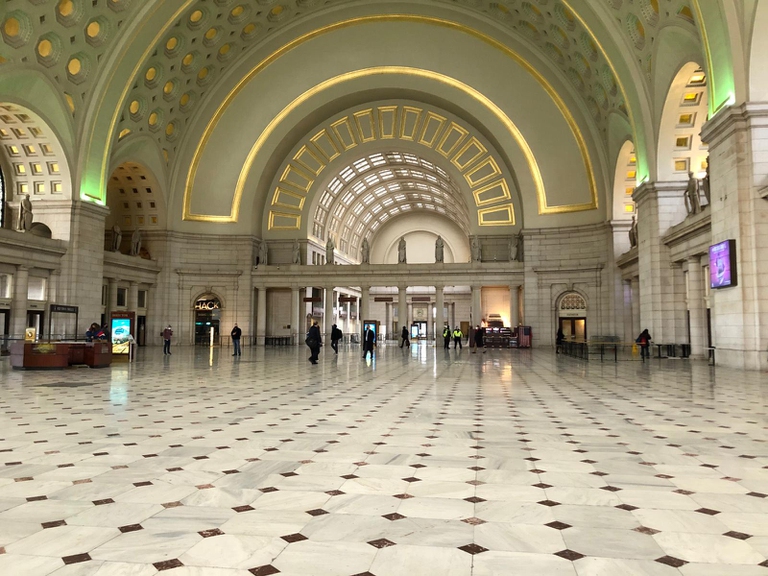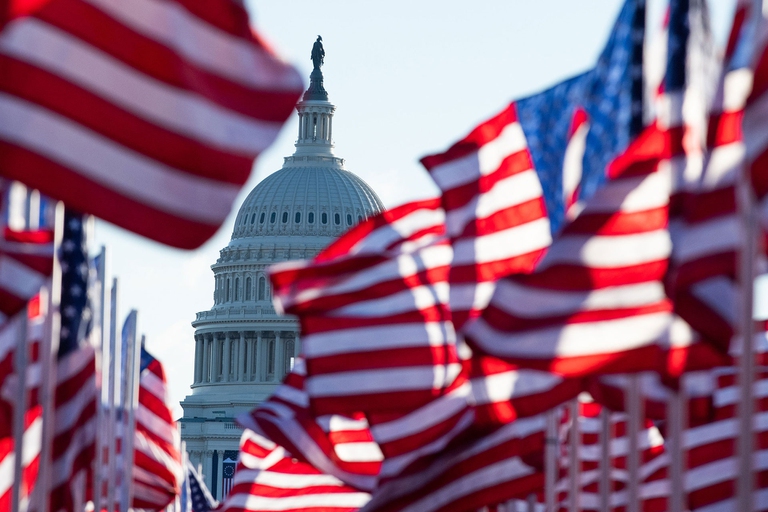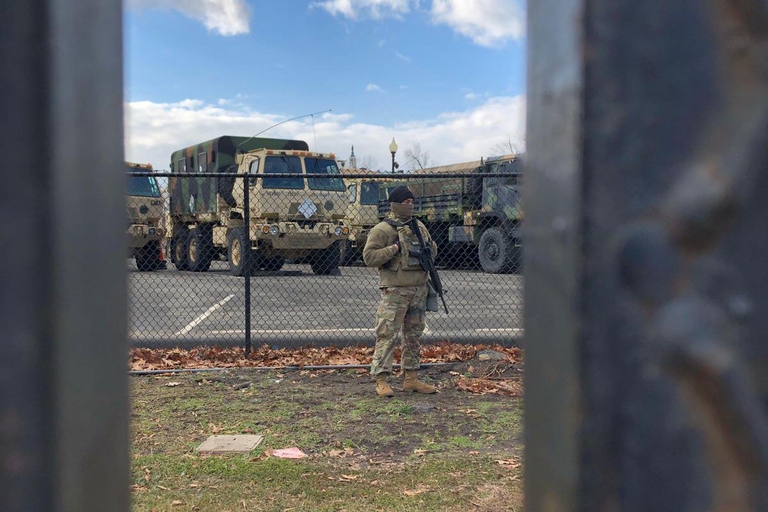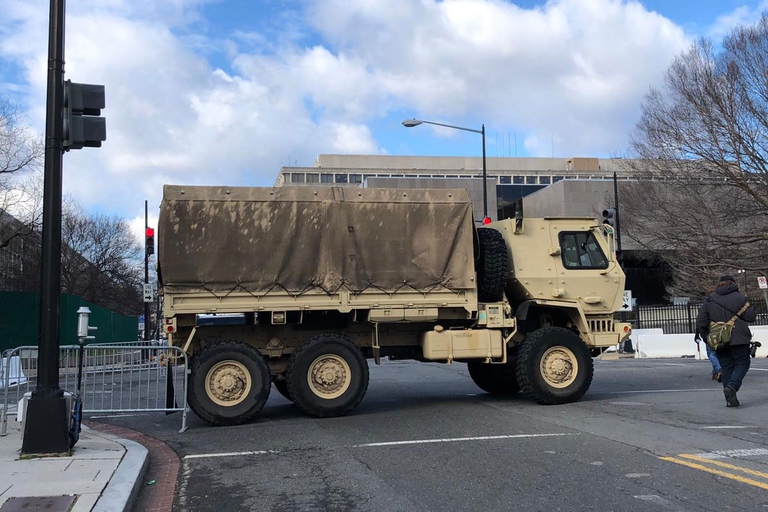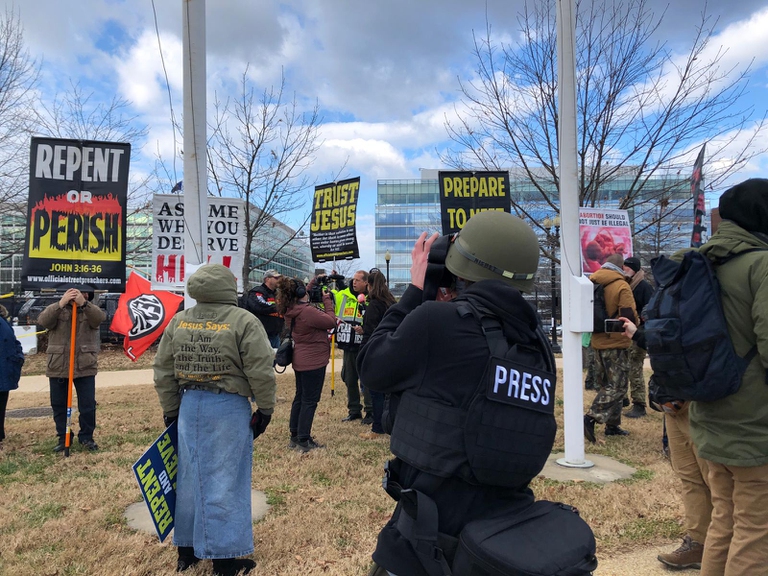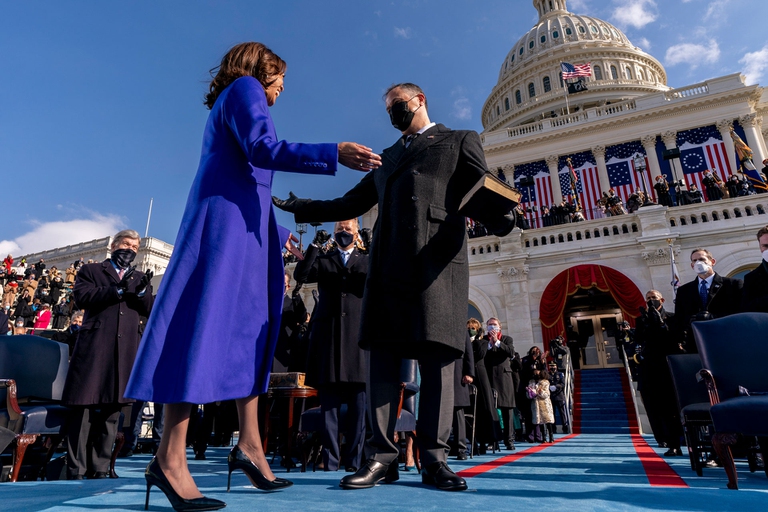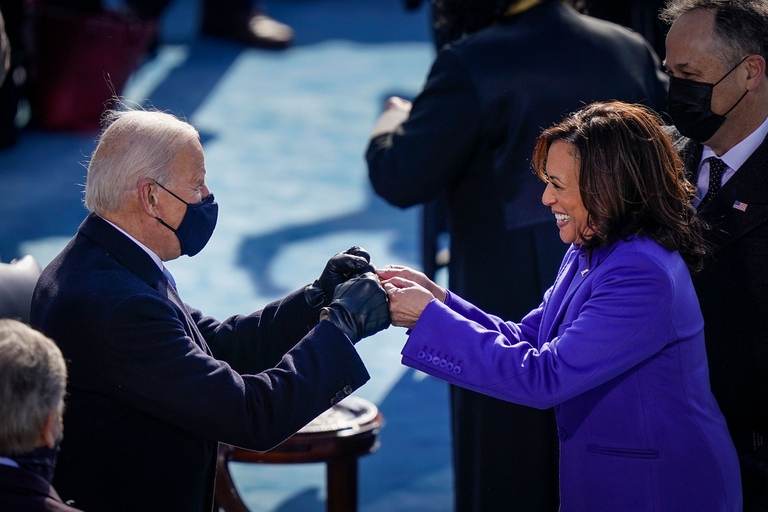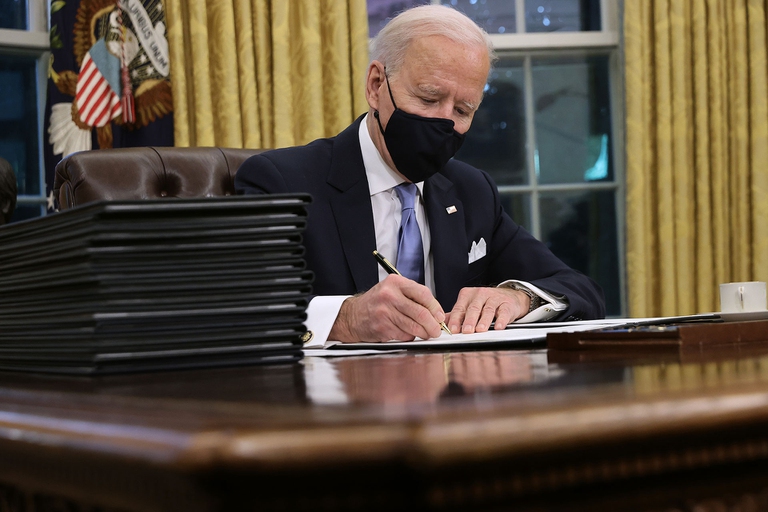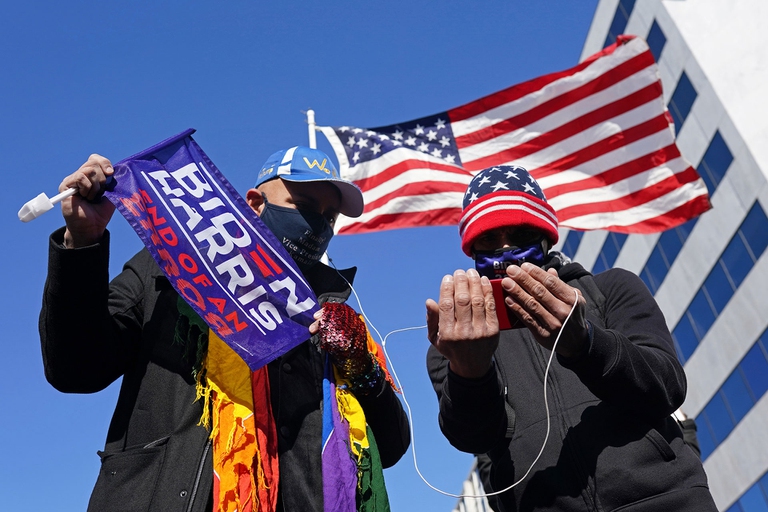
With Joe Biden as US president, the entire international community will be aligned on the climate crisis. We can’t let this chance slip away.
Next stop Washington D.C. A report from the streets of the United States capital on the day of President Joe Biden’s inauguration.
“Next stop: Washington D.C., Union Station”. It’s 9:30 a.m. on 20th January 2021, and I’m travelling from New York to the US capital to witness Joe Biden’s inauguration. The atmosphere upon my arrival at the station is surreal. Just a few dozen people step off the Amtrak train I was on, despite the fact it travelled through a good portion of the East Coast. Armed military and police officers direct us along the path towards the station’s huge, deserted waiting room, surrounded by stores and restaurants whose shutters are all closed.
On exiting Union Station you can immediately see the dome on Capitol Hill – the seat of the US Congress that was stormed by supporters of now-former President Donald Trump on 6th January. This is also why Washington is on high alert today. The National Mall, from Lincoln Memorial to the White House, is closed to the public, shut off with barricades and barbed wire. 25,000 soldiers have been posted along the security perimeter, checking everyone coming in through the few checkpoints and only allowing authorised vehicles through.
The most striking thing, however, isn’t the rifles in the arms of National Guard officers or the military vehicles parked right at the heart of the “world’s greatest democracy”. After all, I was prepared for this having seen similar images all over the news. It’s the bleak atmosphere permeating the streets of the capital that’s giving me pause. The city is still reeling from the violence of a few weeks ago, and, more generally, from the last four years, which have left the country deeply fragmented. There isn’t a soul to be seen along the wide roads in the centre of town. Shops are closed, their windows covered by wooden planks, anticipating further violence. Many restaurants – already required to operate as takeaway and delivery-only due to the pandemic – also chose to stay shut.
Last time I visited Washington was four years ago, in 2016. I remember it being a severe, institutional city, but nevertheless filled with life and proud of its many monuments that were constantly swarmed by throngs of tourists. But this year it’s empty. As I walk into a Starbucks near the White House I’m met by a group of police officers on their break. “We’ve seen a lot of people coming in this morning,” the barista tells me, although she just nods when I point out that they’re one of the few places that have stayed open in the neighbourhood.
Looking at images from recent presidential inaugurations, from Obama to Trump, the difference compared to the current situation is disarming. Millions of people used to travel to Washington from all over the country. This year, only a few hundred were allowed to attend the ceremony, downsized not just for security reasons but also due to the Covid-19 pandemic, as thousands and thousands of new cases are recorded every day. Only journalists walk the streets. No one else dares leave their house.
Joe Biden became the 46th President of the United States at midday exactly. He was sworn in before a few witnesses, one hand on the Bible, outside the West Wing of the Capitol. Kamala Harris, making history as the first female vice president, was sworn in just before Biden.
As Lady Gaga and Jennifer Lopez perform one after the other on the stage, the city remains submerged in an eerie silence. The only place with some movement is right outside Congress, largely due to a multitude of reporters and a small anti-abortion and anti-feminist demonstration. The head of the protest is shouting into his megaphone: “I am happy that Kamala Harris is in the White House, as long as she stays in the kitchen”. Reminding us that, while steps may have been made in the right direction, the road ahead is still long.
“Kamala is the first female vice president. I am related to Susan B. Anthony, who fought her whole life to get women the right to vote”, I’m told by Debby Anthony, one of the few demonstrators I met who was celebrating the inauguration, two placards in hand. “Today I am here standing for her, for Kamala, as vice president, to fulfil her whole life’s work”. “Will Kamala be the first female president, in four years?” I ask. “I don’t know, but she would make a fabulous president”.
After the end of the ceremony, the area in front of Capitol Hill starts to empty out. Biden and Harris, with their respective families, head toward the White House. I also see some buses full of armed officers depart. Perhaps they are drawing a sigh of relief as the expected clashes did not materialise.
Donald and Melania Trump left the White House this morning, unceremoniously, headed for Florida. After all, the last two weeks have seen the former president’s political legacy crumble into smaller and smaller pieces, crushed by the deadly attack on Congress that he incited and refused to denounce.
For Biden, meanwhile, there’s no time to lose. In his first few hours in office, the new president overturned some of the outgoing administration’s key decisions. For example, the United States is set to rejoin the Paris Climate Agreement, and a federal requirement to wear a mask will come into force.
Biden also hopes to revive the US economy with a 1.9-trillion-dollar stimulus package, aimed at aiding recovery after the pandemic. Trump, meanwhile, in his last speech as president, didn’t miss the chance to refer to Covid-19 as the “China virus” one last time. The new administration will aim to fight the pandemic by listening to experts and scientists, and not according to pollsters’ whims.
Another important reform will affect immigration policy. Biden has promised to simplify integration procedures for “Dreamers”, who arrived in the US as minors and have still, years later, not been granted official documents. This would facilitate 11 million people’s path toward US citizenship.
Openness to more permissive migration policies is seen as a beacon of hope for many migrants, so much so that, even before the inauguration, a 9,000-strong caravan of people left Honduras headed toward the US border. However, the group was blocked by Guatemalan law enforcement.
Throughout his four years in the White House, Donald Trump had no regard for the unspoken customs that had been part of US politics for decades. The tycoon has left Washington with few allies and lots of debt, carrying the weight of 400,000 deaths on his shoulders. He now also has the unenviable distinction of being the first president to have faced two separate impeachment proceedings.
Leaving politics aside, the end of the Trump era leaves American society hostile and divided, with social conflict going well beyond party lines. Minority rights, racial and wealth inequality, and the role of armed forces have gone from being topics of debate to issues exploited to rile up the fiercest supporters of Trumpism, many of whom gathered in Washington on 6th January, with consequences that we are all well aware of.
It’s no coincidence that Biden’s inaugural speech revolved around one key theme: “To overcome these challenges — to restore the soul and to secure the future of America — requires more than words. It requires that most elusive of things in a democracy: Unity. Unity”.
National unity, funnily enough, was exactly what was missing in the streets of Washington on 20th January 2021.
Siamo anche su WhatsApp. Segui il canale ufficiale LifeGate per restare aggiornata, aggiornato sulle ultime notizie e sulle nostre attività.
![]()
Quest'opera è distribuita con Licenza Creative Commons Attribuzione - Non commerciale - Non opere derivate 4.0 Internazionale.
With Joe Biden as US president, the entire international community will be aligned on the climate crisis. We can’t let this chance slip away.
Joe Biden obtained more votes than any other candidate in US election history and is en route to becoming the 46th president of the United States.
With a clearer picture of the results, how have countries across the world reacted to the 2020 US elections? What expectations face president-elect Biden?
A report by Ember explains that in 2025 electricity generation from renewables (solar, wind and hydropower) surpassed that from fossil fuel sources.
We wait, suspended in time, to find out who the next president of the United States will be. The results as they stand show a divided country.
New York holds its breath. A report from our correspondent in the Big Apple on the 3rd of November, the day of the 2020 US elections.
The second black female US senator has become the first black female vice-president. Kamala Harris and Joe Biden have made history.
Joe Biden breaks ahead. Sanders falls but stays in the race. Bloomberg is hanging by a thread. Warren is invisible. The final results of Super Tuesday, a key day in the Democratic primaries to choose the candidate for the the US presidential elections.
The Democratic party primaries in the US started on the 3rd of February. We discuss the five frontrunners, one of whom will challenge Donald Trump for the presidency on the 3rd of November 2020.
